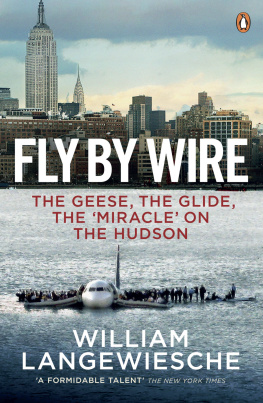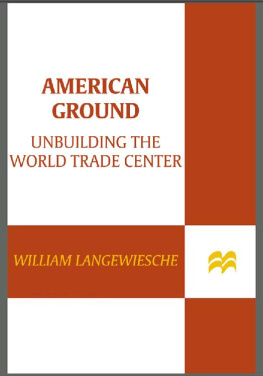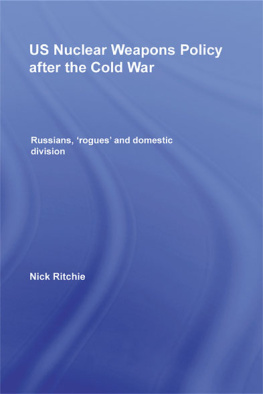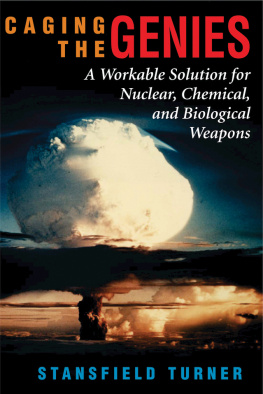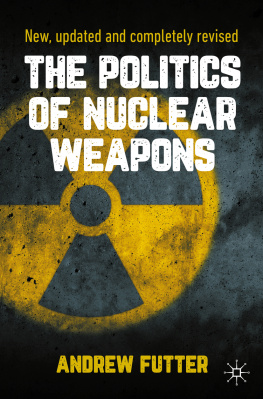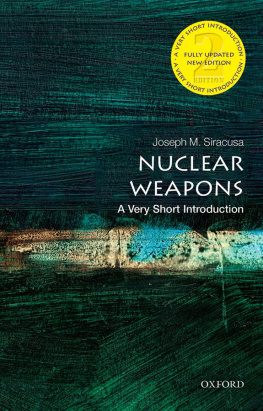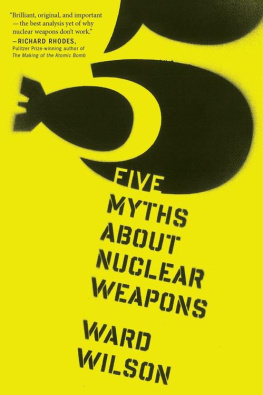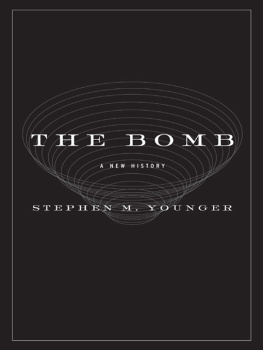THE ATOMIC BAZAAR
ALSO BY WILLIAM LANGEWIESCHE
Cutting for Sign
Sahara Unveiled
Inside the Sky
American Ground
The Outlaw Sea
THE ATOMIC BAZAAR
THE RISE OF THE NUCLEAR POOR
WILLIAM LANGEWIESCHE
ALLEN LANE
an imprint of
PENGUIN BOOKS
ALLEN LANE
Published by the Penguin Group
Penguin Books Ltd, 80 Strand, London WC2R 0RL, England
Penguin Group (USA) Inc., 375 Hudson Street, New York, New York 10014, USA
Penguin Group (Canada), 90 Eglinton Avenue East, Suite 700, Toronto, Ontario, Canada M4P 2Y3
(a division of Pearson Penguin Canada Inc.)
Penguin Ireland, 25 St Stephens Green, Dublin 2, Ireland (a division of Penguin Books Ltd)
Penguin Group (Australia), 250 Camberwell Road, Camberwell, Victoria 3124, Australia
(a division of Pearson Australia Group Pty Ltd)
Penguin Books India Pvt Ltd, 11 Community Centre, Panchsheel Park, New Delhi 110 017, India
Penguin Group (NZ), 67 Apollo Drive, Rosedale, North Shore 0632, New Zealand
(a division of Pearson New Zealand Ltd)
Penguin Books (South Africa) (Pty) Ltd, 24 Sturdee Avenue, Rosebank, Johannesburg 2196, South Africa
Penguin Books Ltd, Registered Offices: 80 Strand, London WC2R 0RL, England
www.penguin.com
First published in the United States of America by Farrar, Straus and Giroux 2007
First published in Great Britain by Allen Lane 2007
1
Copyright William Langewiesche, 2007
Maps copyright Jeffrey L. Ward, 2007
The moral right of the author has been asserted
Grateful acknowledgement is made to The Atlantic Monthly, where this book originated.
Customs Officials Say Iraq Is Shopping for Centrifuge U Enrichment Hardware,
by Mark Hibbs, reprinted by permission of Nuclear Fuel, a Platts publication.
All rights reserved
Without limiting the rights under copyright
reserved above, no part of this publication may be
reproduced, stored in or introduced into a retrieval system,
or transmitted, in any form or by any means (electronic, mechanical,
photocopying, recording or otherwise), without the prior
written permission of both the copyright owner and
the above publisher of this book
A CIP catalogue record for this book is available from the British Library
CONTENTS

THE ATOMIC BAZAAR
ONE
THE VANGUARD OF THE POOR
Hiroshima was destroyed in a flash by a bomb dropped from a propeller-driven B-29 of the U.S. Army Air Corps, on the warm morning of Monday, August 6, 1945. The bomb was not chemical, as bombs until then had been, but atomic, designed to release the energies that Einstein had described. It was a simple cannon-type device of the sort that today any number of people could build in a garage. It was bulbous and black, about ten feet long, and weighed ninety-seven hundred pounds. It fell nose-down for forty-three seconds and, for maximum effect, never hit the ground. One thousand nine hundred feet above the city it fired a dull gray plug of highly enriched uranium down a steel tube into a receiving lump of the same refined material, creating a combined uranium mass of 133 pounds. In relation to its surface area, that mass was more than enough to achieve criticality and allow for an uncontrollable chain of fission reactions, during which subatomic particles called neutrons collided with uranium nuclei, releasing further neutrons, which collided with other nuclei, in a blossoming process of self-destruction. The reactions could be sustained for just a millisecond, and they fully exploited less than two pounds of the uranium atoms before the resulting heat forced a halt to the process through expansion. Uranium is one of the heaviest elements on earth, almost twice as heavy as lead, and two pounds of it amounts to only about three tablespoonfuls. Nonetheless the release of energy over Hiroshima yielded a force equivalent to fifteen thousand tons (fifteen kilotons) of TNT, achieved temperatures higher than the suns, and emitted light-speed pulses of lethal radiation. More than 150,000 people died.
Their executioner was an ordinary pilot named Paul Tibbets, who was twenty-nine then and is still alive now, in Ohio. He neither abhorred nor enjoyed the kill: he was a flight technician, removed from the slaughter by altitude and speed, and coddled by a pressurized, well-heated cockpit. That morning the sky was quiet, with no sign of enemy opposition. The B-29 cruised thirty-one thousand feet above the city in smooth air. It lurched and nosed upward when the bomb fell clear. Tibbets banked steeply to get away and turned the airplanes tail on the destruction. When the bomb ignited, now far behind and below, it lit the sky with the prettiest blues and pinks that Tibbets had ever seen. The first shock wave came shimmering through the atmosphere and overtook the airplane from behind, causing a sharp bump measured at 2.5 gs by a cockpit accelerometer. The bump felt about like the near miss of an antiaircraft burst, or the jolt of crossing a pothole in a jeep. A second shock wave then hit, but it was a reflection off the ground, like an echo of the first, and therefore even less intense. Tibbets tasted the fillings in his teeth. He saw the cloud rising over Hiroshima, and, as must be expected, he felt no regrets.
Still, Hiroshima was not good for him. Though he became a brigadier general in the U.S. Air Force, and later the chairman of an executive-jet company, he suffered from the stigma of having killed so many, and he grew bitter about any implication that what he had done was wrong. It was unrealistic and probably unfair to expect him to repent, but over the decades American elites did just that, having first required him to drop the bomb. In his retirement he took to traveling around the country giving talks to war buffs and like-minded reactionaries. He showed up at air shows, I suppose to shake hands. In the 1990s, he waded angrily into a minor controversy about the Smithsonians display of the forward section of his airplane, the Enola Gay, and accused the elites of manipulating public opinion for their self-interest. He said he was a pilot and soldier, and by implication a simple man. He sold trinkets on the Internet, including, for $500, a beautifully rendered one-twelfth-scale atomic-bomb model mounted on a (solid, not veneer) mahogany base, and accompanied by an autographed data plate. For those with smaller budgets, he offered a sheet of thirty-six commemorative stamps picturing a B-29 soaring beyond a mushroom cloud, with excellent detail of boiling smoke on the ground. Tibbets may have been bullheaded, but at least he was consistent. When the writer Studs Terkel interviewed him in 2002, eleven months after the September 11 attacks, he did not bemoan the sadness of war or ruminate on the difficulty of facing a stateless foe, but opted true to form for a nuclear response. Against Kabul? Cairo? Mecca? He said, Youre gonna kill innocent people at the same time, but weve never fought a damn war anywhere in the world where they [he meant we] didnt kill innocent people. If the newspapers would just cut out the shit: Youve killed so many civilians! Thats their tough luck for being there.
Tibbets spoke from experience, and in a narrow sense he was right: it was indeed just tough luck for all the innocents who died under his wings in 1945. Those people, however, did not constitute collateral casualtiesany more than the victims in the World Trade Center did. In fact Hiroshima had been chosen primarily as a civilian target and had in part been exempted from conventional firebombing to preserve it for the most dramatic possible demonstration of a nuclear strike. Three days later, the city of Nagasaki was hit by an even more powerful devicea sophisticated implosion-type bomb built around a softball-sized sphere of plutonium, which crossed the weight-to-surface-area threshold of criticality when it was symmetrically compressed by carefully arrayed explosives. A twenty-two-kiloton blast resulted. Though much of the city was shielded by hills, about seventy thousand people died. Quibblers claim that a demonstration offshore, or even above Tokyo harbor, might have induced the Japanese to surrender with less loss of lifeand that if not, another bomb was ready. But the intent was to terrorize a nation to the maximum extent, and there is nothing like nuking civilians to achieve that effect.
Next page

